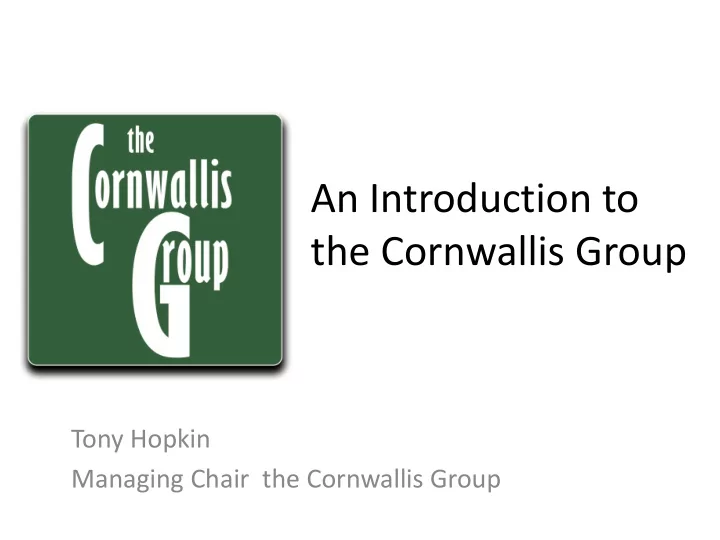

An Introduction to the Cornwallis Group Tony Hopkin Managing Chair the Cornwallis Group
History • A small concerned gathering of analysts at ISMOR – New threats to world peace – OA addressing current or old threats – Inadequate opportunity to look at new approaches to new problems – Large workshops limit comprehensive exchange • Out of ISMOR, in 1996, The The Cornwallis Group takes its name from Cornwallis Park, Nova Scotia, home to the Pearson Peacekeeping Centre; Cornwallis Group was born venue for the Group meetings until 2003. Cornwallis Park, in turn, is named for Colonel Edward Cornwallis, Governor of Nova Scotia in the mid-18th century; Edward was uncle to Charles Cornwallis, the general who surrendered the British Army to George Washington, at Yorktown in 1781.
Mission • A vehicle for excellence in analysis for the purposes of international peace and stability • A bridge between national military agencies, other governmental departments, international and non- governmental organizations that often work together on the ground, but seldom meet in a reflective environment to discuss issues of common concern • The group intends to reach out to those organizations, which do not usually participate in military conferences, to engage with them in establishing a common understanding of the wider constraints under which we are attempting to deal with new operational challenges
Principles • A platform for new ideas, problems, and techniques to contribute to international peace and stability • Conduct symposia and workshops, and publications • Alternate US/CAN and EU • Open to all who would like to participate • All nations are welcomed • Three day residential workshop • Minimum of one hour of floor time • Opportunities for presentations outside the themes
More than a workshop – a community www.thecornwallisgroup.org/ The Cornwallis Group The Cornwallis Group Golf Trophy www.facebook.com/groups/thecornwallisgroup/
Uniquely Cornwallis Group ISMOR, MORS and The Cornwallis Group met at the 82 nd MORS Symposium. The following were identified as positive and unique to the Cornwallis Group • Forward learning and academic • Feedback by referees papers (peer review) • Exploring analytical challenges beyond direct operational operations • More orientated to peace, stability, security • The reach to OGD, CSO, NGO • 1-hour papers, deeper discussion
Topics covered • Analysis for Evaluation and Assessment • Analysis of Trafficking and Transnational Threats • Analysis for Future Conflict • Analysis for The Future of Afghanistan • Analysis of Societal Conflict and Counter-Insurgency • Analysis in Support of Policy • Analysis for Multi-Agency Support • Analysis for Civil-Military Transitions • Analysis for New and Emerging Societal Conflicts • Analysis for Stabilization and Counter-Terrorist Operations • Analysis for Governance and Stability • Analysis for Compliance and Peace Building • Analysis for Assessment, Evaluation and Crisis Management • Analysis for Crisis Response and Societal Reconstruction • Analysis of Civil-Military Interactions • Analysis for Peace Operations • Analysis for and of the Resolution of Conflict • Analytic Approaches to the Study of Future Conflict
Cornwallis XIX: Analysis of Commercial & Market Force Roles in Conflict Management & Mitigation • Private companies and Civil Society Organizations (CSOs) are increasingly considered a partner in the prevention, settlement and transformation of violent conflicts. • Their future as part of the mix within operational theatres seems assured for the immediate and medium term. • How has analysis has been used to produce a ‘Blended Solution’ plan of action to improve the effectiveness of the response? • The Group has accepted presentations that cover issues outside the theme. This principle will contribute to the richness of discussions.
Enjoy the workshop!
Recommend
More recommend